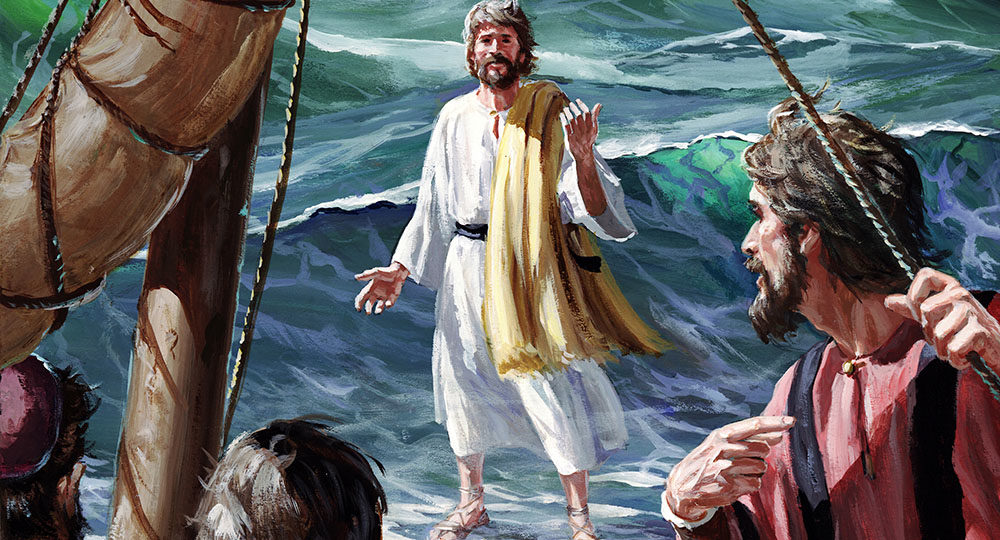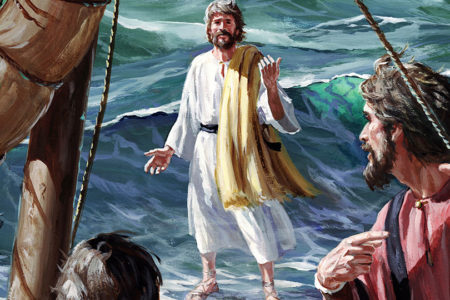More Than a Prophet
Many people believe Jesus was a good man and a prophet. Some will even admit He was the Son of God who came to Earth. But tell them Jesus was God Himself who appeared in human flesh, and that is where you may part company.
Yet the Bible teaches Jesus Christ was unequivocally God incarnate. One of the ways He demonstrated His deity was by asserting authority that belongs to God alone.
The prophet Isaiah foretold the Messiah’s unique nature: “The virgin shall conceive and bear a Son, and shall call His name Immanuel” (Isa. 7:14). This particular baby Boy would be conceived without a human father but would be human in every sense, while fully God. His name, Immanuel (Hebrew for “El [God] with us”), revealed His true identity.
Some 700 years later, angels announced the Child’s birth to Temple shepherds in the fields near Bethlehem. The shepherds found the Child lying in a manger, exactly as the angels had proclaimed.
The Baby’s humble surroundings did little to reveal the authority that would be vested in Him. Approximately 30 years later, He manifested that authority in every facet of His ministry: He healed the sick, controlled nature, expelled demons, forgave sins, and raised the dead. In other words, He did what God alone can do.
He also astounded multitudes, “for He taught them as one having authority, and not as the scribes” (Mt. 7:29). Unlike the Jewish leaders of His day, Jesus did not quote scholars or refer to commentaries; His authority resided in Himself.
Authority to Heal
The Gospel of Matthew records how a distraught Roman centurion begged Jesus to heal his servant. As Jesus and the thronging crowds entered Capernaum in Galilee, the city Jesus used as His headquarters, the centurion met them and pleaded, “Lord, my servant is lying at home paralyzed, dreadfully tormented” (8:6). Not only was the centurion a Gentile, but he was also a Roman soldier—a despised reminder of Israel’s subjugation to Rome.
Without hesitation, Jesus responded, “I will come and heal him” (v. 7).
The centurion confessed, “Lord, I am not worthy that You should come under my roof. But only speak a word, and my servant will be healed” (v. 8).
As a soldier in a position of power, the centurion understood everything boiled down to authority. Just as he could issue a command and it would be obeyed, he knew Jesus could merely say the word, without even entering the centurion’s home, and the servant would be healed. Jesus gave the command, and the servant was healed immediately.
Authority to Control Nature
Cool afternoon winds routinely rush down the slopes of the surrounding hills on the Sea of Galilee, making the lake one of modern Israel’s most popular windsurfing spots.
But when conditions are right, the winds can hit the center of the lake with such force they capsize boats. As Jesus and His disciples sailed across the Sea of Galilee toward Gadara, they apparently encountered this phenomenon. Jesus “was in the stern, asleep on a pillow” (Mk. 4:38).
In a panic, the disciples bailed water and did all they could to keep the boat from sinking. Soaking wet and battered by intense wind and waves, they hurried to Jesus shouting, “Lord, save us! We are perishing!” (Mt. 8:25).
After scolding them for their lack of faith, Jesus “arose and rebuked the winds and the sea, and there was a great calm” (v. 26). Jesus stopped both the wind and the waves.
The disciples were astounded: “The men marveled, saying, ‘Who can this be, that even the winds and the sea obey Him?’” (v. 27).
He did what only God can do.
Authority to Expel Demons
After they arrived safely at the other side of the lake, they encountered two demon-possessed men described as “exceedingly fierce, so that no one could pass that way” (v. 28). When these violent men saw Jesus, they shrieked, “What have we to do with You, Jesus, You Son of God? Have You come here to torment us before the time?” (v. 29).
Convinced they would be confined in judgment, the demons begged Him, “Permit us to go away into the herd of swine” that was feeding on the mountain (v. 31; cf. Lk. 8:32).
Jesus commanded them, “Go” (Mt. 8:32); and the demons left the men and entered the swine. The herd immediately went berserk, charged down the slope, and drowned in the Sea of Galilee. Though this was probably not the outcome the demons intended, they were nonetheless obligated to submit to Jesus’ authority. When He spoke, they obeyed.
Authority to Forgive Sin
Then Jesus returned to Capernaum. He was teaching in a house in the city, and Jewish leaders from every town in Galilee, Judea, and Jerusalem showed up to hear Him (Lk. 5:17). Suddenly, bits of the ceiling began to fall on the guests. Four men were on the roof, dismantling it so they could lower their paralyzed friend into Jesus’ presence. The large crowd outside the door impeded them from getting their friend to Jesus any other way.
Jesus told the paralytic, “Son, be of good cheer; your sins are forgiven you” (Mt. 9:2).
Knowing only God can forgive sins, the Jewish leaders and teachers immediately thought, “This Man blasphemes!” (v. 3).
Had Jesus not been God, they would have been correct. But to demonstrate His authority to forgive sin, Jesus provided tangible evidence by healing the paralyzed man, telling him, “Arise, take up your bed, and go to your house” (v. 6). The young man immediately rose to his feet and walked out the door, in plain sight of the religious leaders and astounded crowd (v. 7).
Authority to Raise the Dead
Perhaps Jairus, a ruler in the synagogue at Capernaum, had seen Jesus heal the paralyzed man. It appears that, later the same day, Jairus came to Jesus because his 12-year-old daughter was dying. Before Jesus could make His way to the man’s home, word came the girl had died (Lk. 8:49).
Jesus comforted Jairus: “Do not be afraid; only believe, and she will be made well” (v. 50). At Jairus’s home, Jesus issued a simple command: “Little girl, arise” (v. 54). The girl’s “spirit returned, and she arose immediately” (v. 55). Only God could recall the child’s departed spirit and bring her back to life.
The Babe in Bethlehem’s manger was truly “God with us,” as His ministry powerfully demonstrated. His unprecedented teaching and His ability to heal the sick, control nature, expel demons, forgive sins, and even raise the dead signified His authority as God.
Prior to His ascension, Jesus told His disciples, “All authority has been given to Me in heaven and on earth” (Mt. 28:18).
Jesus was indeed a teacher and a prophet, as many claim. But He was more. He was God who came to Earth. He demonstrated His deity time and again by exercising authority that belongs to God alone. And though it may be difficult for some to believe God became a man, it is no more difficult than believing an omnipotent God can do as He pleases.
Perhaps people should ask themselves what God asked Abraham when He promised Abraham’s 89-year-old wife, Sarah, would give birth to a son the following year: “Is anything too hard for the Lᴏʀᴅ?” (Gen. 18:14).








